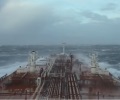Asia tanker freight rates at record high amid supply squeeze, but payment delays likely: traders

Asia’s tanker freight rates were at record highs across vessel sizes Thursday due to a supply squeeze as trading companies snapped up tonnage to load low-priced refined products, but were increasingly unable to unload at destination ports as consumption plunges amid COVID-19 pandemic lockdowns, traders said.
Market participants in Singapore, South Korea and Japan said this could soon call into question the commercial sustainability of tanker shipping and the financial health of companies that manage it.
The entire supply chain has been severely impacted as more than 150 clean product tankers globally, most of them LR2s, were being utilized for floating storage or stranded in long queues waiting to berth, particularly in Europe, brokers, owners and charterers said. This has resulted in rates skyrocketing as ships are unable to return to pick up their next cargoes, they said.
An LR1 was reportedly chartered by China’s Unipec at w500 for May 9 gasoil loading on the Sikka-East Africa route, while an LR2 has been taken by ATC at $7 million on the Yanbu-UKC route – rates unheard of in modern maritime history, sources said. Such high rates are not only being offered, but also accepted on most of the major routes across the globe, they said.
“All sectors of tankers are very firm all over the world,” a chartering executive with a commodities trading company said.
Market participants describe it as a “zero sum game” in which traders are enamored by ultra low refined product prices in the Middle East and countries such as India that strive to get rid of their surplus in double quick time. They are chartering dozens of ships for delivery of gasoil and jet fuel to Europe or for floating storage near Singapore and to move naphtha into North Asian countries such as Japan and South Korea, sources said.
The turnaround time for a tanker to discharge cargo and return to load the next parcel has become indefinite because of partial or complete shutdowns in many countries reeling from the coronavirus pandemic.
With no automobiles on the roads and hardly any passenger planes in the skies, there is very limited consumption of gasoil, gasoline and jet fuel by end-users, but refineries continue to produce them and charterers are loading cargoes on ships and moving them to ports where they cannot discharge, tanker brokers in Singapore and Tokyo said.
“Ships are just waiting, waiting and waiting,” one broker said.
“In Europe, there is no discharge order or berthing plan,” said a chartering source in Singapore, adding: “Tankers are just drifting.”
A newbuild LR2 the MT Pantelis on a three-year time charter to Equinor was delivered around mid-March, loaded a cargo in South Korea and reached Tanjung Pelepas in early April, and has been floating off the eastern outer port limits of Tanjung Pelepas ever since, likely for storage, sources said.
Equinor could not be immediately reached for comment, but sources tracking these movements said that dozens of such ships in East Asia are either being used for planned storage or stranded due to ullage-related delays. The region is one of several planned storage or congestion hotspots across the globe, sources said.
Initially the tankers were taken for floating storage due to a contango market, to sell refined product cargoes later and reap profits, but now as product prices continue to fall, dozens of ships are simply drifting because shore tanks are full, market sources said.
LATE PAYMENT FEARS
The spike in rates implies that an owner can now earn around 180,000/day for an LR2 and more than $100,000/day for an LR1 on the benchmark Persian Gulf-North Asia routes. However, many owners are concerned that payment will be delayed, as freight payments are made only after the discharge of the cargo at the destination, a tanker broker in Singapore said.
Market participants are particularly concerned about the delay in the discharge of cargoes in Europe, which mean the freight will not be paid for on time. The demurrage payments may even be delayed further.
When cargoes are stuck outside port limits, their payments are pending from end-receivers, and charterers are not in a position to pay the freight, even when owners insist on it.
“The demurrage payments may take few months to a year,” the broker said.
He said that for some routes and vessel sizes, freight as a percentage of cargo price has touched 30%.
This is not sustainable and has raised concerns at a time when the financial health of oil and shipping companies is also on the radar of regulatory authorities, banks and courts.
Hin Leong Trading and Ocean Tankers have filed for protection under Section 211B of the Singapore Companies Act, which gives a company protection from debtors. There is now a serious threat of its cascading to other energy and shipping related companies which have exposure to Hin Leong Trading and Ocean Tankers, said a chartering executive who deals which such enterprises.
Source: Platts

 Hellenic Shipping News Worldwide Hellenic Shipping News Worldwide, Online Daily Newspaper on Hellenic and International Shipping
Hellenic Shipping News Worldwide Hellenic Shipping News Worldwide, Online Daily Newspaper on Hellenic and International Shipping























 PG-Software
PG-Software